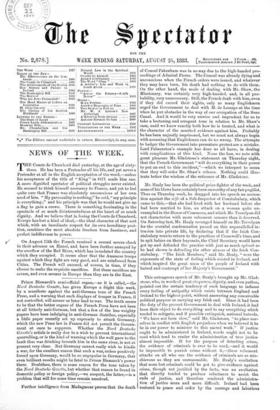Farther intelligence from Madagascar proves that the death
of Consul Pakenham was in no way due to the high-handed pro- ceedings of Admiral Pierre. The Consul was already dying and unconscious when the French orders were issued, and whatever they may have been, his death had nothing to do with them. On the other hand, the mode of dealing with Mr. Shaw, the Missionary, was certainly very high-handed, and, in all pro- bability, very unnecessary. Still, the French dealt with him, even if they did exceed their rights, only as many Englishmen urged the Government to deal with M. de Lesseps at the time when he put obstacles in the way of our occupation of the Suez Canal. And it would be very unwise and imprudent for us to take a hectoring and arrogant tone in relation to Mr. Shaw's case, until we know exactly both how he is treated, and what is the character of the asserted evidence against him. Probably he has been unjustly imprisoned, but we must not always begin with assuming that Englishmen can do no wrong. The attempts to badger the Government into premature protest are a mistake. Lord Palmerston's example has done us all harm, in dealing with complications of this kind. None the less, we note with great pleasure Mr. Gladstone's statement on Thursday night, that the French Government "will do everything in their power to put an end to this incident,"—which we interpret to mean that they will order Mr. Shaw's release. Nothing could illus- trate better the wisdom of the reticence of Mr. Gladstone.


































